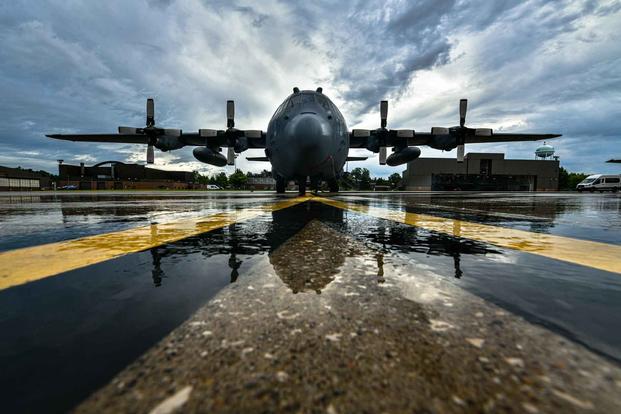The Air Force is slowly returning its C-130 Hercules to service after grounding the aircraft earlier this month after cracks in a part that holds the propeller were discovered on many older models.
In total, 116 C-130Hs were determined to be potentially affected by the issue, Air Mobility Command told Military.com earlier this month. As of this week, two planes have returned to service and others will eventually be cleared.
"As of this time, two aircraft have been returned to service," Air Mobility Command spokesman Maj. Beau Downey told Military.com in an emailed statement Monday.
Read Next: Air Force Offers More Privacy for Sexual Harassment Victims with New Policy
The majority of the C-130H fleet was grounded earlier this month when an issue with the propeller barrel assembly was first discovered at Robins Air Force Base in Georgia.
"During a post-depot operation engine run check at Warner Robins Air Logistics Complex, the maintenance crew encountered a persistent leak on one of their C-130H propellers," Air Mobility Command said in an emailed statement Oct. 4. "When the propeller assembly was removed and turned into the WR-ALC Prop Shop, a technician noted a crack in the propeller barrel assembly."
Despite the slow process of returning the C-130Hs to the air, Air Mobility Command said in Monday's statement that "we continue to have sufficient airlift to meet our global requirements."
Similar issues have popped up for the C-130Hs in the past. More than 100 of the cargo aircraft were temporarily removed from service after wing cracks were discovered during routine maintenance in August 2019, Military.com previously reported.
And earlier in 2019, 60 C-130H Hercules aircraft were taken out of service to examine and replace engine propeller blades that inspectors deemed risky because the blades were manufactured before 1971.
Replacing the propeller blades due to the latest issue will take quite a while, according to Air Mobility Command, and the service is looking for ways to move the inspections along.
"We are looking at multiple avenues for accelerating the fixes, but anticipate the process to safely inspect and if necessary replace the affected propellers will take some time," Downey said in an emailed statement.
The C-130 Hercules is just the latest aircraft to be grounded by the service.
In mid-August, Air Force Special Operations Command ordered all its CV-22 Ospreys to stop flying after recording four hard clutch engagements since 2017, an issue in which power surges into one of the two engines on the aircraft. None of those incidents happened in combat, and none was fatal.
By September, the Ospreys were cleared to fly again, but the root problem still hasn't been identified.
In late July, Air Combat Command grounded its fleet of F-35A Lightning II jets and the 19th Air Force's Air Education and Training Command stopped flying nearly 300 of its T-38 Talon and T-6 Texan II training planes over concerns about their ejection seats after a recall was issued on a part.
By mid-August, the F-35s and training planes were back in the air.
-- Thomas Novelly can be reached at thomas.novelly@military.com. Follow him on Twitter @TomNovelly.
Related: Air Force Grounds C-130Hs to Examine Propeller Barrel Cracks














